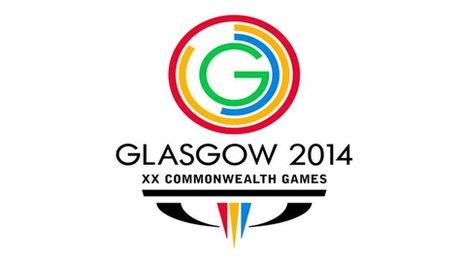Glasgow 2014: The athletes seeking disability 'key role'
- Published
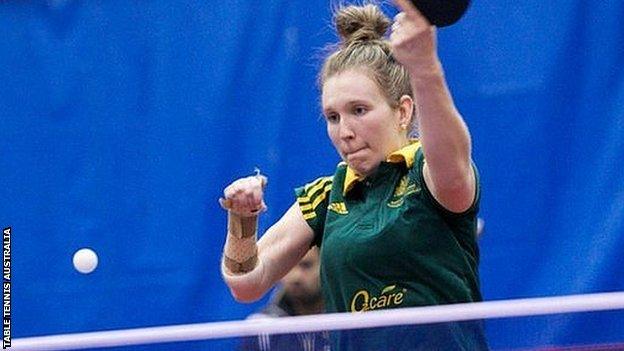
Melissa Tapper is aiming for a medal in the able-bodied team event at the Glasgow Commonwealth Games
Glasgow 2014 Commonwealth Games |
|---|
Dates: 23 July - 3 August Coverage: Live on BBC TV, HD, BBC Radio 5 live, Red Button, Connected TVs, online, tablets and mobiles |
Melissa Tapper and Sophie Thornhill are competing in very different events at Glasgow 2014 but both share a similar objective - to show that elite athletes with a disability have a key role to play at the Commonwealth Games.
Australian Tapper, who was born with Erbs Palsy that left her with nerve damage to her right shoulder and arm, will compete against able-bodied athletes in the table tennis competition.
English cyclist Thornhill, who is visually impaired, will ride in the Para-cycling events, insisting she is just as athletic, just as skilful and just as determined as her able-bodied counterparts.

Sophie Thornhill and Rachel James celebrate gold at Para-cycling Track World Championships
Tapper, 24, will be creating history in Glasgow as the first Australian athlete with a disability to compete on an able-bodied team and will take part in both the team and mixed doubles events.
"At times, people have a different attitude towards me because I have a disability," she says.
"But I just try to go out there and show them that I am there to compete like everyone else.
"I want to win, so they will have to beat me."
Thornhill, already a double world champion at 18, will be chasing success in the tandem kilo and sprint events at the Sir Chris Hoy Velodrome.
Thornhill's Commonwealth Games schedule | |
|---|---|
Thursday, 24 July: Women's Sprint B2 Tandem | |
Sunday, 27 July: Women's 1,000, Time Trial B2 Tandem |
"We want to show that we have the same level of athleticism and skill as able-bodied riders," the teenager from Disley in Cheshire told BBC Sport.
"Some people still think Para-athletes aren't as elite as able-bodied riders, but we train day in and day out and are working just as hard."
Thornhill, who has a form of albinism that affects the pigment in her skin and eyes, has been forced to form a new partnership for the Games.
At the World Championships, she was piloted by Rachel James.
In Glasgow, the two will be in opposition.
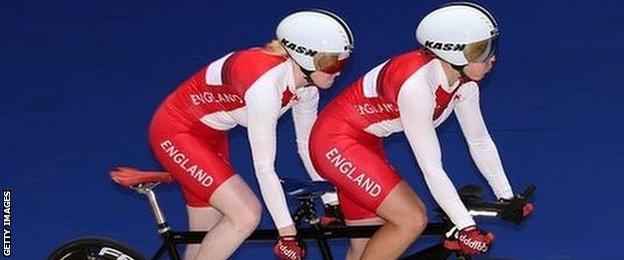
Sophie Thornhill and Helen Scott are making their Commonwealth Games debuts
James will pilot former swimmer Rhiannon Henry for Team Wales, while Thornhill has teamed up with Helen Scott to represent Team England.
Para-cycling is making its debut in Glasgow, but Para-sport has been integrated into the Commonwealth Games since Manchester in 2002, when 20 nations participated in 10 medal events across five sports.
In 2014, 300 athletes from more than 20 countries will chase 22 gold medals in cycling, athletics, swimming, powerlifting and lawn bowls.
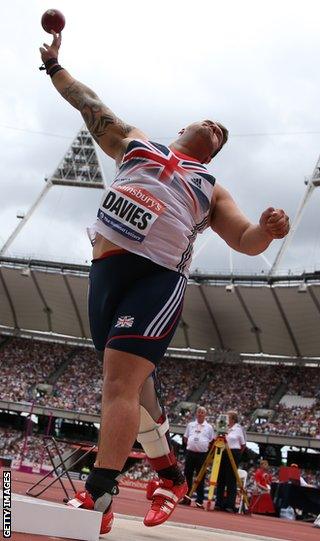
Welshman Aled Davies won discus gold and shot put bronze at the London Paralympics
"Para-sport in the Commonwealth is definitely growing," said David Grevemberg, Glasgow 2014 chief executive. "It's about keeping the quality but managing the quantity."
Among the Para-sport athletes on show in Glasgow will be Paralympic gold medallists like David Weir, Aled Davies, Ollie Hynd and Neil Fachie.
Missing will be a number of other London 2012 champions, notably Ellie Simmonds, Jessica-Jane Applegate, Jonnie Peacock, Hannah Cockroft, Josie Pearson and Dame Sarah Storey as their Para-sport events are not part of the Glasgow programme.
"I'm very envious of those who have events at the Games," says amputee sprinter Peacock, who is also world champion in his 100m event.
"It's great for those who have been selected to have a mainstream event which includes Para-sport races."
Weir, too, admits the thought of representing England for the first time in Glasgow was a big factor when deciding whether to continue competing after his success in the wheelchair events at 2012.
"If I had retired, it would have been at the back of my mind whether I could I have gone on and competed at the Commonwealths," said the four-time London gold medallist.
"I'm very proud to represent England and I'm enjoying my sport now and really looking forward to racing at Hampden Park."
As for Tapper, her impairment primarily affects her service action, although she says she has never regarded herself as disabled.
She rebuffed invitations from the Australian Paralympic Committee when she was 14 and eventually became the country's top junior, just failing to qualify for the 2008 Olympics and the 2010 Commonwealth Games.
Tapper's Commonwealth Games schedule |
|---|
Thursday, 24 July to Saturday, 26 July: Team qualification |
Sunday, 27 July: Team medal matches |
Wednesday, 30 July to Friday, 1 August: Mixed doubles rounds |
Saturday, 2 August: Mixed doubles finals |
In 2010, she was finally persuaded to compete for the APC in a tournament in Jordan.
From then on, she competed in both disabled and able-bodied events.
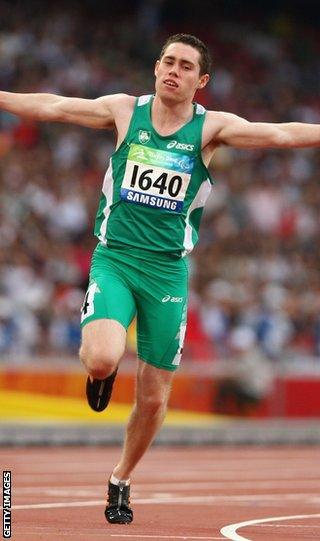
Northern Ireland sprinter Jason Smyth will compete against able-bodied athletes in Glasgow
At London 2012, she missed out on a medal in the Paralympics, letting a 2-0 lead slip in the bronze medal play-off with China's Lei Fan.
Tapper shrugged off that setback, determined to make the Commonwealth Games in Glasgow when trials took place in February.
"I wanted to do everything I could in terms of my preparation, so if I didn't qualify then I just wasn't good enough," she says.
"I had suffered heartbreak so many times before that I was beginning to doubt myself. I knew this could be one of my last chances, so I put everything on the line."
A nightmare first day of trials was followed by a fantastic second day.
"I wanted to finish at least fifth, because I knew I would still have a good chance of selection, but to finish third was unbelievable," she says.
"I knew I had won my place on the team because I was as good as or better than the other girls. That was the cream on top."
Tapper will not be the only Paralympic athlete competing in the able-bodied events in Glasgow.
Sprinter Jason Smyth and swimmer Bethany Firth will do too, for Northern Ireland, emulating former Commonwealth competitors who have done so before - the South African swimmer Natalie du Toit, English archer Danielle Brown and English cyclist Dame Sarah Storey.
Then, once the Games are over, Rio comes into view.
"I want to be a sponge and soak up everything I can because I would love to compete in both the Olympics and Paralympics in Rio," says Tapper.
- Published15 July 2014
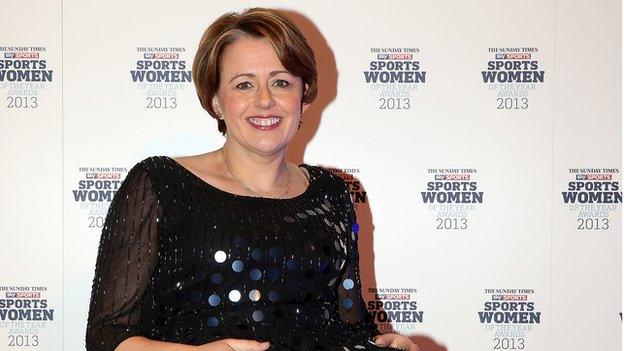
- Published20 May 2014
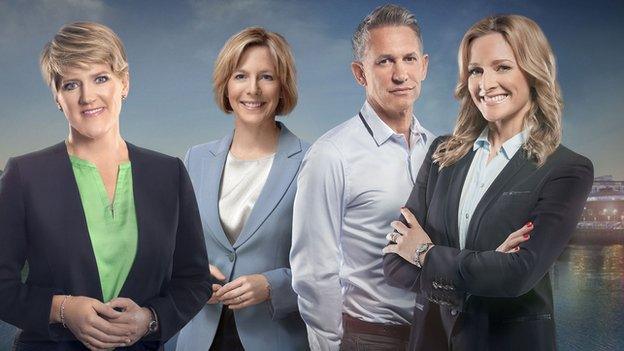
- Published16 July 2014
